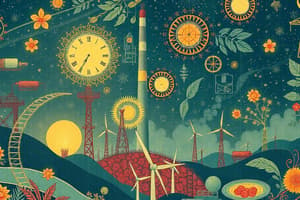Podcast
Questions and Answers
What is the definition of energy?
What is the definition of energy?
- Potential to create resources
- Ability to do work (correct)
- Capacity for movement
- Source of heat
Which of the following are considered fossil fuels?
Which of the following are considered fossil fuels?
- Natural gas (correct)
- Coal (correct)
- Hydroelectric power
- Sunny energy
What is crude oil primarily made up of?
What is crude oil primarily made up of?
- Oxygen molecules
- Silicates
- Hydrocarbon chains (correct)
- Metal alloys
What is the main process used to refine petroleum into usable fuels?
What is the main process used to refine petroleum into usable fuels?
Why are fossil fuels classified as non-renewable energy?
Why are fossil fuels classified as non-renewable energy?
Which fossil fuel is primarily used to produce diesel and asphalt?
Which fossil fuel is primarily used to produce diesel and asphalt?
What are the characteristics of coal as a fossil fuel?
What are the characteristics of coal as a fossil fuel?
Where does the term 'petroleum' originate from?
Where does the term 'petroleum' originate from?
What primary substance is natural gas mostly composed of?
What primary substance is natural gas mostly composed of?
Which process leads to the formation of coal from dead plants?
Which process leads to the formation of coal from dead plants?
What type of energy is generated from the splitting of atoms?
What type of energy is generated from the splitting of atoms?
How does coal bed methane differ from other forms of natural gas?
How does coal bed methane differ from other forms of natural gas?
Which fossil fuel is known to cause air and water pollution, contributing significantly to global CO2 emissions?
Which fossil fuel is known to cause air and water pollution, contributing significantly to global CO2 emissions?
What was a primary factor in the formation of petroleum and natural gas?
What was a primary factor in the formation of petroleum and natural gas?
What keeps fossil fuels from being entirely replaced by renewable energy sources?
What keeps fossil fuels from being entirely replaced by renewable energy sources?
Which of the following is NOT a type of coal mentioned?
Which of the following is NOT a type of coal mentioned?
Flashcards
Non-renewable energy
Non-renewable energy
Energy sources that will run out or will be replenished very slowly.
Fossil fuels
Fossil fuels
Fuels formed from ancient plant and animal remains.
Fossil
Fossil
A fossil fuel's origin, implying its ancient past.
Petroleum is the same as Oil
Petroleum is the same as Oil
Signup and view all the flashcards
Crude oil
Crude oil
Signup and view all the flashcards
Fractional distillation
Fractional distillation
Signup and view all the flashcards
Coal
Coal
Signup and view all the flashcards
High carbon content
High carbon content
Signup and view all the flashcards
Coal Formation
Coal Formation
Signup and view all the flashcards
Natural Gas Composition
Natural Gas Composition
Signup and view all the flashcards
Nuclear Energy
Nuclear Energy
Signup and view all the flashcards
Petroleum Formation
Petroleum Formation
Signup and view all the flashcards
Sedimentary Rock
Sedimentary Rock
Signup and view all the flashcards
Environmental Concerns (Fossil Fuels)
Environmental Concerns (Fossil Fuels)
Signup and view all the flashcards
Renewable Energy
Renewable Energy
Signup and view all the flashcards
Study Notes
Energy Sources
- Energy is the ability to do work
- Non-renewable energy sources will eventually run out
- Fossil fuels are formed from fossilized remains of plants and animals
- These fuels have high carbon content
Fossil Fuels
- Oil (Petroleum):
- Mined and then transported to refineries
- Refined into usable fuels like gasoline, propane, and kerosene
- Comes from the Greek words "petra" (rock) and "oleum" (oil)
- Fractional distillation is used for refining
- Crude Oil:
- A fossil fuel made up of hydrocarbon chains
- Coal:
- Solid, mainly made up of carbon
- Types include anthracite, bituminous, subbituminous, and lignite
- Formed from the pressure and heat of buried plant matter
- Natural Gas:
- Mostly methane
- Used as a fuel to create materials and chemicals
- Found in coal deposits
Formation of Fossil Fuels
- Coal:
- Formed over millions of years from plants buried in swamps
- Heat and pressure transformed plant matter into coal
- Petroleum and Natural Gas:
- Formed from tiny marine plants and animals buried on the ocean floor
- Buried remains were subjected to immense heat and pressure, transforming them into oil and natural gas
Environmental Concerns
- Fossil fuels cause pollution like CO2 emissions
- They are being replaced by more sustainable sources at a slower rate
- Air and water pollution are major consequences
Renewable Energy
- Renewable energy sources aren't dependent on fossil fuels or nuclear processes
- Solar Energy: Uses the sun's energy
- Biofuel: From recently dead organisms
- Hydroelectric Energy: Uses the flow of water
- Geothermal Energy: Uses the Earth's heat
- Wind Energy: Uses wind turbines
Converting Energy into Electricity
- Heat Energy: Bond breaking/formation converts into energy
- Kinetic Energy: Heat turns water into steam which has kinetic energy
- Mechanical Energy: Steam's kinetic energy turns machines
- Electrical Energy: Mechanical energy from machines creates electricity through electromagnetism
Studying That Suits You
Use AI to generate personalized quizzes and flashcards to suit your learning preferences.




